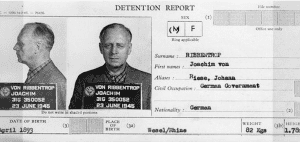Joachim von Ribbentrop remains a pivotal and controversial figure in the history of Nazi Germany. As Foreign Minister from 1938 to 1945, he played a significant role in shaping the nation’s diplomatic landscape during a tumultuous era.

Early Life and Career
Born on April 30, 1893, in Wesel, Germany, Joachim von Ribbentrop’s early life showed no hint of the role he would later play in history. He embarked on a career in the business world, including a stint as a wine merchant. However, his life took a dramatic turn in the 1930s when he became involved in Adolf Hitler’s inner circle.
Rise to Power
Joachim von Ribbentrop’s connection with Hitler began in the early 1930s, when he served as a foreign affairs advisor to the Nazi Party. His charisma and loyalty to the Fuhrer catapulted him into a prominent role within the Nazi regime. In 1936, he was appointed as the German Ambassador to the United Kingdom, where he endeavored to establish closer relations between Nazi Germany and Britain, albeit with limited success.
Key Role in the Molotov-Ribbentrop Pact
One of Joachim von Ribbentrop’s most significant diplomatic achievements was the signing of the Molotov-Ribbentrop Pact in 1939, often referred to as the Nazi-Soviet Non-Aggression Pact. This agreement, between Nazi Germany and the Soviet Union, included a secret protocol dividing Eastern Europe into spheres of influence. This pact allowed Hitler to launch World War II with a reduced risk of a two-front war, as it ensured Soviet neutrality.
War Crimes and Nuremberg Trials
As World War II progressed, Ribbentrop’s role in the Nazi war machine became increasingly apparent. He was involved in planning and executing various aspects of Nazi foreign policy, including the Holocaust. After the war, he was arrested by the Allies and put on trial at the Nuremberg Trials.
Conviction and Execution
Joachim von Ribbentrop, along with other high-ranking Nazi officials, faced charges of war crimes and crimes against humanity at the Nuremberg Trials. He was found guilty on multiple counts, primarily related to his involvement in initiating the war and his participation in the Holocaust. On October 16, 1946, Joachim von Ribbentrop was executed by hanging, becoming one of the first prominent Nazis to face the ultimate punishment for his actions.
Legacy and Controversy
The legacy of Joachim von Ribbentrop remains deeply controversial. While he was undoubtedly a key figure in Nazi Germany’s diplomatic efforts and played a role in facilitating the Nazi war machine, opinions on his true level of influence and culpability vary. Some argue that Joachim von Ribbentrop was primarily a loyal follower who carried out orders, while others see him as a more active participant in the horrors of the Nazi regime.
In Conclusion
Joachim von Ribbentrop’s life is a sobering reminder of the complexities of history. From a humble beginning as a wine merchant to becoming one of the central figures in Nazi Germany’s diplomatic corps, his journey was emblematic of the tumultuous era in which he lived. His involvement in the Molotov-Ribbentrop Pact and subsequent trial at Nuremberg continue to spark debates about his level of responsibility and the extent of his actions. Regardless of one’s perspective, Joachim von Ribbentrop’s role in history is a somber chapter in the story of the 20th century.
Cite This Article
"Joachim von Ribbentrop: A Complex Figure in Nazi Germany" History on the Net© 2000-2024, Salem Media.
July 25, 2024 <https://www.historyonthenet.com/joachim-von-ribbentrop-a-complex-figure-in-nazi-germany>
More Citation Information.